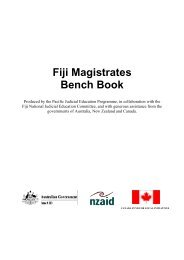Tuvalu Island Courts Bench Book - Federal Court of Australia
Tuvalu Island Courts Bench Book - Federal Court of Australia
Tuvalu Island Courts Bench Book - Federal Court of Australia
You also want an ePaper? Increase the reach of your titles
YUMPU automatically turns print PDFs into web optimized ePapers that Google loves.
Statements <strong>of</strong> opinion<br />
The opinion <strong>of</strong> a witness is irrelevant. Their duty is to tell what was seen, heard and done. They<br />
must only state the facts, not what they think or believe.<br />
The exception is where an expert is giving evidence on things within their expertise. An expert<br />
is a person who has acquired a skill in a particular subject by training, experience or study.<br />
5.4 Refreshing Memory<br />
In certain criminal cases a Police <strong>of</strong>ficer may refer to notes taken at the time <strong>of</strong> the incident. For<br />
example, by looking at his or her notebook, but only if the Police <strong>of</strong>ficer wrote down what took<br />
place immediately at the time <strong>of</strong> going to the incident.<br />
On outer islands, this may cause a problem given the role <strong>of</strong> the Police <strong>of</strong>ficer as Prosecutor in<br />
criminal cases. This may create a conflict.<br />
In civil cases, a witness may refer to a document that he or she has made or verified and which<br />
has been produced to the other party in advance.<br />
5.5 Evidence from Children<br />
If a young child is a witness, or a party to an action, the <strong>Court</strong> must decide if he or she is capable<br />
<strong>of</strong> giving evidence. Such evidence can be sworn on oath or not.<br />
The general rule is that the younger the child, the less likely it will be that they can give<br />
evidence. Any evidence that they give should be in the presence <strong>of</strong> their parent(s).<br />
The <strong>Court</strong> has to decide the level <strong>of</strong> understanding <strong>of</strong> the child and what reliance (if any) is to be<br />
placed on what they said.<br />
5.6 Evidence <strong>of</strong> a Spouse<br />
In criminal cases, an accused’s husband or wife:<br />
• may give evidence for the prosecution, but does not have to;<br />
• may give evidence for the defence.<br />
5.7 Self – Incrimination<br />
A witness cannot be asked a question which, if they answer it, may result in them admitting that<br />
they committed an <strong>of</strong>fence.<br />
<strong>Tuvalu</strong> <strong>Island</strong> <strong><strong>Court</strong>s</strong> <strong>Bench</strong> <strong>Book</strong> June 2004
















